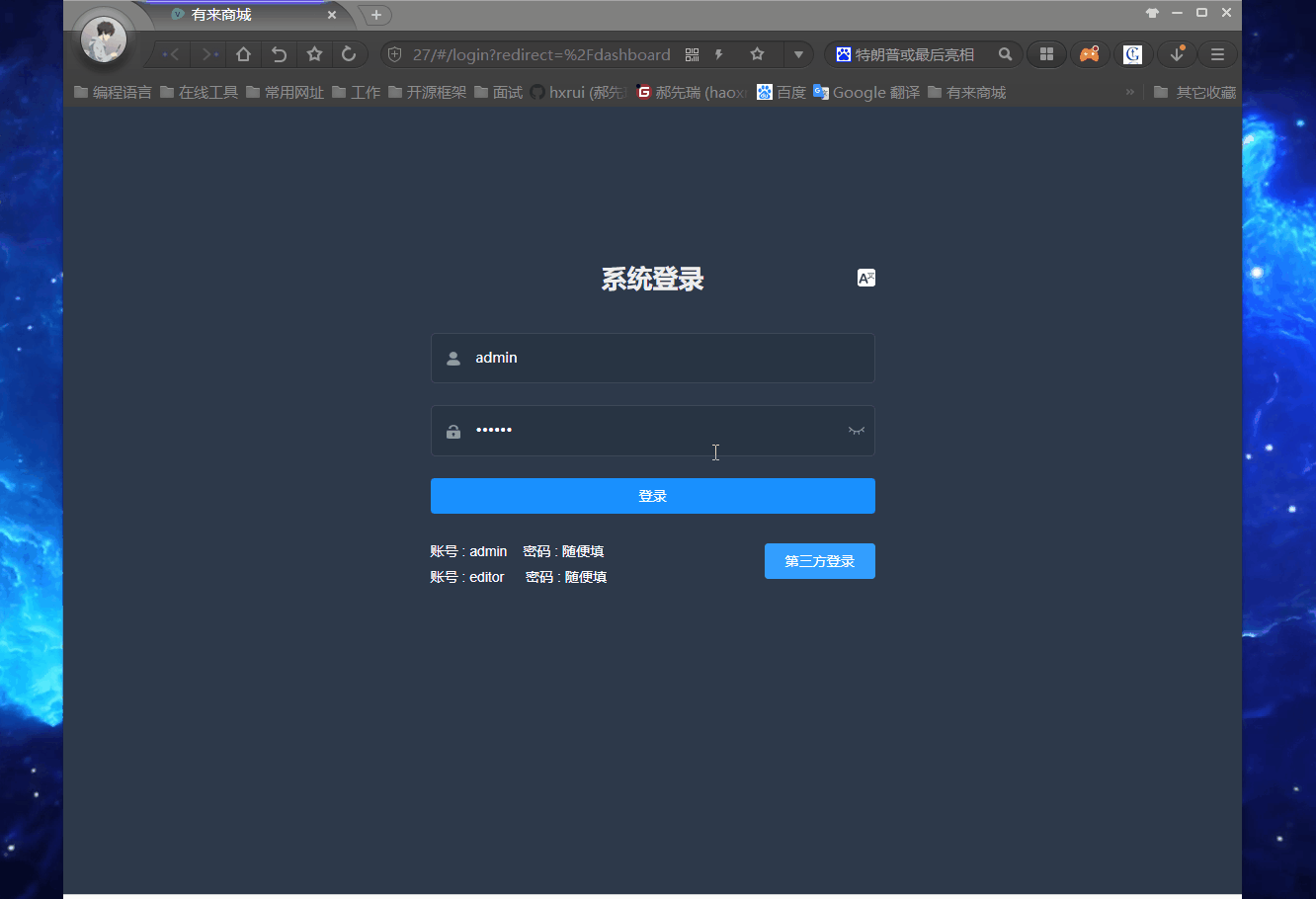Spring Cloud實戰 | 第九篇:Spring Cloud整合Spring Security OAuth2認證伺服器統一認證自定義異常處理
阿新 • • 發佈:2020-11-24
[本文完整程式碼下載點選](https://github.com/hxrui/youlai-mall.git)
 # 一. 前言
相信瞭解過我或者看過我之前的系列文章應該多少知道點我寫這些文章包括建立 [有來商城youlai-mall](https://github.com/hxrui/youlai-mall.git) 這個專案的目的,想給那些真的想提升自己或者迷茫的人(包括自己--一個工作6年覺得一無是處的菜鳥)提供一塊上升的基石。專案是真的從無到有(往期文章佐證),且使用當前主流的開發模式(微服務+前後端分離),最新主流的技術棧(Spring Boot+ Spring Cloud +Spring Cloud Alibaba + Vue),最流行的統一安全認證授權(OAuth2+JWT),好了玩笑開完了大家別當真,總之有興趣一起的小夥伴歡迎加入~
接下來說下這篇文章的原因,之前我是沒想過應用到專案中的OAuth2+JWT這套組合拳這麼受大家關注,期間一直有童鞋問怎麼自定義Spring Security OAuth2的異常處理、JWT怎麼續期、JWT退出等場景下如何失效等問題,所以最近有點時間想把這套統一認證授權完善掉,本篇就以如何自定義Spring Security OAuth2異常處理展開。
**往期文章連結:**
>
# 一. 前言
相信瞭解過我或者看過我之前的系列文章應該多少知道點我寫這些文章包括建立 [有來商城youlai-mall](https://github.com/hxrui/youlai-mall.git) 這個專案的目的,想給那些真的想提升自己或者迷茫的人(包括自己--一個工作6年覺得一無是處的菜鳥)提供一塊上升的基石。專案是真的從無到有(往期文章佐證),且使用當前主流的開發模式(微服務+前後端分離),最新主流的技術棧(Spring Boot+ Spring Cloud +Spring Cloud Alibaba + Vue),最流行的統一安全認證授權(OAuth2+JWT),好了玩笑開完了大家別當真,總之有興趣一起的小夥伴歡迎加入~
接下來說下這篇文章的原因,之前我是沒想過應用到專案中的OAuth2+JWT這套組合拳這麼受大家關注,期間一直有童鞋問怎麼自定義Spring Security OAuth2的異常處理、JWT怎麼續期、JWT退出等場景下如何失效等問題,所以最近有點時間想把這套統一認證授權完善掉,本篇就以如何自定義Spring Security OAuth2異常處理展開。
**往期文章連結:**
>
 # 一. 前言
相信瞭解過我或者看過我之前的系列文章應該多少知道點我寫這些文章包括建立 [有來商城youlai-mall](https://github.com/hxrui/youlai-mall.git) 這個專案的目的,想給那些真的想提升自己或者迷茫的人(包括自己--一個工作6年覺得一無是處的菜鳥)提供一塊上升的基石。專案是真的從無到有(往期文章佐證),且使用當前主流的開發模式(微服務+前後端分離),最新主流的技術棧(Spring Boot+ Spring Cloud +Spring Cloud Alibaba + Vue),最流行的統一安全認證授權(OAuth2+JWT),好了玩笑開完了大家別當真,總之有興趣一起的小夥伴歡迎加入~
接下來說下這篇文章的原因,之前我是沒想過應用到專案中的OAuth2+JWT這套組合拳這麼受大家關注,期間一直有童鞋問怎麼自定義Spring Security OAuth2的異常處理、JWT怎麼續期、JWT退出等場景下如何失效等問題,所以最近有點時間想把這套統一認證授權完善掉,本篇就以如何自定義Spring Security OAuth2異常處理展開。
**往期文章連結:**
>
# 一. 前言
相信瞭解過我或者看過我之前的系列文章應該多少知道點我寫這些文章包括建立 [有來商城youlai-mall](https://github.com/hxrui/youlai-mall.git) 這個專案的目的,想給那些真的想提升自己或者迷茫的人(包括自己--一個工作6年覺得一無是處的菜鳥)提供一塊上升的基石。專案是真的從無到有(往期文章佐證),且使用當前主流的開發模式(微服務+前後端分離),最新主流的技術棧(Spring Boot+ Spring Cloud +Spring Cloud Alibaba + Vue),最流行的統一安全認證授權(OAuth2+JWT),好了玩笑開完了大家別當真,總之有興趣一起的小夥伴歡迎加入~
接下來說下這篇文章的原因,之前我是沒想過應用到專案中的OAuth2+JWT這套組合拳這麼受大家關注,期間一直有童鞋問怎麼自定義Spring Security OAuth2的異常處理、JWT怎麼續期、JWT退出等場景下如何失效等問題,所以最近有點時間想把這套統一認證授權完善掉,本篇就以如何自定義Spring Security OAuth2異常處理展開。
**往期文章連結:**
>